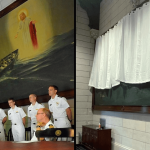I love this piece by David Neff:
The 150 evangelical leaders who met behind closed doors on January 14 to anoint a Republican candidate for President were wise not to have invited me.
I believe that Christians have an urgent duty to engage the social, economic, and moral threats to a healthy society. That requires a wide variety of political action. However, one thing it doesn’t call for is playing kingmaker and powerbroker.
By conspiring to throw their weight behind a single evangelical-friendly candidate, they fed the widespread perception that evangelicalism’s main identifying feature is right-wing political activism focused on abortion and homosexuality. In truth, it is hard to imagine the Religious Left in 2008 doing something similar: holding a conclave to decide whether they would throw their collective weight behind either Hilary Clinton or Barack Obama, unwilling to leave the Democratic primary results to the voters….
When evangelicals are confined to a partisan kennel, it is easy to think we are exercising real power. In fact we are, to use the old Soviet phrase, serving as “useful idiots.” Christianity Today founder Billy Graham discovered this had happened to him. Out of an abundance of enthusiasm and good will, he tried to aid Richard Nixon in his campaign. Later, when Watergate transcripts revealed the true Nixon, Graham realized he had been used.
We are tempted to think we can be kingmakers and powerbrokers, that we can deliver or withhold the support of a voting bloc. But if there is any lesson in the story of this year’s primary elections, it is this: evangelicals have not voted as a bloc and many are not following their leaders. (Ironically, in December several news pieces described the lack of consensus on a candidate among Iowa evangelicals–and then referred to them as a voting “bloc.” How could they be a “bloc” if they couldn’t agree which they hated more: Mitt’s Mormonism or Newt’s infidelities?)
Rather than trying to demonstrate power through the promise or threat of votes, evangelicals should use influence. Influence is a matter of education and persuasion—informing and convincing constituents and lawmakers alike. In the past four decades, the number of evangelical advocacy groups operating in Washington, DC, has grown thirteenfold, from three to thirty-nine. These groups focus on a variety of issues, both domestic and international: human rights, global poverty, religious freedom, bioethics, family life, and immigration, among them. They advocate for legislation that will address these problems, but because they need everyone’s support, they have learned to work both sides of the aisle.
We should also exercise influence by focusing our talent on the institutions of influence—the universities, think tanks, and media outlets where elites shape culture. James Davison Hunter advocated this approach in his book, To Change the World. But he didn’t advocate it as a strategy for cultural change so much as an exercise in serving the common good.
In 2010, Hunter told Christianity Today, “Whenever Christian churches and organizations partake in the will to power, they partake in the very thing they decry in society.”















